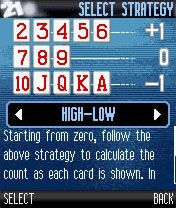
As a teen, I used to scour game magazine for the one thing that would enable me to finish the toughest of titles: the cheats. Admittedly, cheating – even in the comfort of your own company – never felt very good. The feeling that you've copped out by typing in a code sullies the achievement of beating those games that otherwise refuse to be beaten.
It's a bit of a paradox then that 21, a game that focuses on the art of card reading when playing Blackjack, schools you in beating the house at a professional level. Rather than a full on cheat, 21 is an insight into the ways of Blackjack masters, who can bet the farm on reaching – and not busting past – that magical number.
Though often immortalised by the media as a gift that requires an almost alien level of skill, card counting is actually a simple exercise in maths, where set formulas are applied to determine the probability of a strong hand of cards.
Glu's 21, however, is tied to last year's film of the same name, in which the likes of Kevin Spacey attempt to bring an Ocean's Eleven style of cool to card counting. The game, sadly, struggles with this mantle.
Its main problem is it has no idea whether it should focus on the functional aspect of card counting, or whether it should present it as the sleek and stylish lifestyle choice portrayed in Robert Luketic's movie. In the end, 21 falls somewhere awkwardly between the two, offering a tutorial mode that attempts to teach the ways of the counter combined with a casino experience that wants to slot straight into Casino Royale's opening credits.
This is shoddy style over substance, play without a core and, more importantly, any kind of guidance.
21's Class Room mode is the first stop for the green, attempting to teach you the various methods of card counting. Enabling you to pick the number of cards to count and the speed at which they fly across the screen, 21 employs four different methods that assign unit values to whole groups of cards. For example, if you use the most popular method – 'High-Low' – cards 2-6 are worth 1 point, 7-9 count for nothing and everything else knocks one off the score.
Using this means it's then your job to work out the final tally, the idea being that a higher number equates to a greater chance of winning a hand at Blackjack. For newcomers who have never card counted, an explanation of how to employ it in a game is key. But Glu's actual attempt to do so is woefully barren, the game's text focusing on the thrill of card counting at the table rather than just why and how you do it.
Conversely, when you actually enter 21's casinos, the experience switches. Gone is any sense of personality, with invisible players and your view literally restricted to the table. 21 is entirely perfunctory at this point, the idea being to use the skills you've picked up in training to determine just how you bet in play.
The game does try and lace your actions with consequence, warning you not to stay in the same casino for too long (the delicate path card counting treads between legal and illegal tactics in the real world is stressed from the outset) in case you raise the alarm, but the plain nature of its presentation means there isn't any real sense of either danger or indeed celebration.
Quite bizarrely, too, 21 runs at a snail's pace, every action you take coming with a delay and play itself undermined by a sense of slow motion. It's just another chip away at what remains a perfectly cursory and safe attempt to incorporate card-reading into a Blackjack title.
Those who have been bowled over by its sparkle on the big screen might find 21 all too slight and sluggish to really shine.
21

